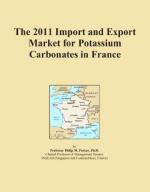|
This section contains 939 words (approx. 4 pages at 300 words per page) |

|
Overview
Potassium carbonate (poe-TAS-ee-yum KAR-bun-ate) is also known as potash, pearl ash, salt of tartar, carbonate of potash, and salt of wormwood. It is a white, translucent, odorless, granular powder or crystalline material that tends to absorb water from the air. As it does, it is converted into the sesquihydrate ("sesqui" = one-and-a-half) with the formula K2CO3·1.5H2O. That formula means that three molecules of potassium carbonate share two molecules of water among them.
Key Facts
Other Names:
See Overview.
Formula:
K2CO3
Elements:
Potassium, carbon, oxygen
Compound Type:
Salt (inorganic)
State:
Solid
Molecular Weight:
138.21 g/mol
Melting Point:
898°C (1650°F)
Boiling Point:
Not applicable; decomposes above melting point
Solubility:
Soluble in water; insoluble in ethyl alcohol
Potash is easily produced by pouring water over the ashes of burned plants and then evaporating the solution formed in large pots (hence the name: "pot" "ash"). The...
|
This section contains 939 words (approx. 4 pages at 300 words per page) |

|


